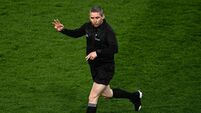England no longer expects the Three Lions to roar
Ireland may not be part of the spectacle that began late last night in Brazil, but England are. And we all know what that means. Michael D may be cheering on the neighbours from his perch in the Áras, but a fair chunk of those watching in these parts will be gunning for the Azzurri when Roy Hodgson’s lads get their World Cup campaign underway against Italy in Manaus tomorrow.
Then Uruguay, and then Costa Rica.












